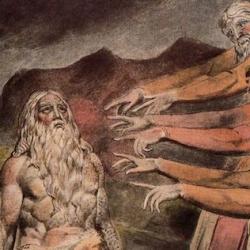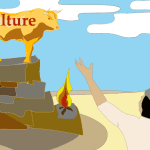Naked and “unaccommodated” on a storm-shaken heath, Lear comes to see his failures as a king:
“Poor naked wretches, whereso’er you are, / That bide the pelting of this pitiless storm, / How shall your houseless heads and unfed sides, / Your loop’d and window’d raggedness, defend you / From seasons such as these? O, I have ta’en / Too little care of this! Take physic, pomp; / Expose thyself to feel what wretches feel, / That thou mayst shake the superflux to them, / And show the heavens more just” ( Lear 3.4).
Job likewise complains about the absence and elusiveness of God (23:9-17), and then presents his evidence (24:2-12a):
“Some remove the landmarks; they seize and devour flocks. They drive away the donkeys of the orphans; they take the widow’s ox for a pledge. They push the needy aside from the road; the poor of the land are made to hide themselves altogether. Behold, as wild donkeys in the wilderness they go forth seeking food in their activity, as bread for their children in the desert. They harvest their fodder in the field and glean the vineyard of the wicked. They spend the night naked, without clothing, and have no covering against the cold. They are wet with the mountain rains and hug the rock for want of a shelter. Others snatch the orphan from the breast, and against the poor they take a pledge. They cause the poor to go about naked without clothing, and they take away the sheaves from the hungry. Within the walls they produce oil; they tread wine presses but thirst. From the city men groan,
And the souls of the wounded cry out.”
Despite all this, “God does not pay attention to folly” (v. 23b). The petty and serious injustices that surround Job elicit a bewildered “why?”: “Why are times not stored up by the Almighty? Why do those who know Him not see His days?”
In this as in so many ways Lear is a Job. By suffering, both sympathize with sufferers. In and through agony, both arrive at fresh political insight.















